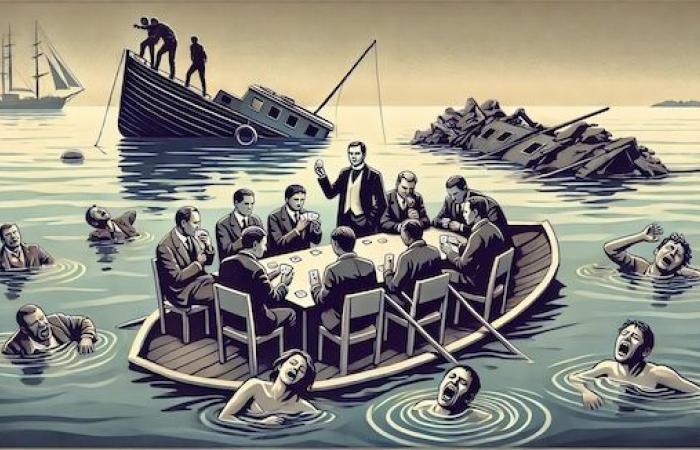The economic decline of Europe, and especially of France, compared to other major players such as the United States and China, among others, is now proven. It is observed regardless of the quantitative indicators (growth, productivity) and qualitative indicators (delay or even outright absence in all new technological sectors such as AI or biotech). The most worrying thing is not the dropout itself – missing trains happens. The most worrying thing is the lack of reaction, or even simply interest, in this vital question. This lack of interest is particularly surprising on the part of the major schools, and in particular the management schools, which should be at the forefront of the mobilization.
150 years ago, the development of the large organization resulting from the second industrial revolution gave rise to a new profession, that of manager. The concerted demands of manufacturers to have employees trained for this purpose and the entrepreneurial opportunism of university institutions gave birth to management schools. From the start, the project was to make management a profession in the same way as a doctor, accountant or lawyer. The primary objective of this new institution was to legitimize and institutionalize the new profession of manager.
Professions are laden not only with economic implications, but also with cultural significance. They carry important societal norms and values regarding issues such as the relationship between knowledge and power and the maintenance of trust. This notion includes, among other things, a social compact between the professions and society as a whole, as well as a certain set of relationships between professional schools, the professional groups for which they serve as communities of authority, and society. Professions thus benefit from important privileges in exchange for their contribution to improving the social order. For example, a company must have an auditor once it reaches a certain size, thus ensuring a captive market for an entire profession. In this project, expertise, autonomy and ethics of service to society were considered distinctive characteristics of professions. The professionalization project was a dismal failure, and the schools continued their development without having a philosophy about their purpose, an absence which persists to this day. This absence is particularly illustrated by their difficulty in finding a name: are they management schools, business schools, or even business schools? These names refer to different fields and reflect a real identity problem.
Nevertheless, the notion of service to society, or at least the societal dimension of management, remained very present for many years, even if it weakened significantly in the 80s and 90s. The role of the manager in the economy and in society as a whole was seen as essential: powerful and well-managed companies were the key to prosperity, and therefore to democracy. When World War II arrived, American schools mobilized to support the war effort. Reports from the Ford Foundation and Carnegie Corporation, published in 1959, expressed concern about the weakness of schools in the face of postwar challenges. Here again, there was no doubt in anyone's mind that they had an essential role to play for the economic solidity of the country. We can naturally criticize the responses to these challenges, and many people did not hesitate to do so, but one thing is certain: they were in phase, or tried to be, with the great challenges of their time.
A deafening silence
Unfortunately, the same cannot be said of French management schools at the moment. The Draghi report, a wake-up call on European delay for those who were not yet aware of it, was published with fanfare on September 9, 2024. We could not be clearer on the situation. It was a real call for general mobilization. What happened? Nothing. Politicians ignored him. Either, it is in the spirit of the times that they ignore what is important and devote themselves to their little maneuvers. But the major teaching and research institutions? Nothing, nada. Management schools? Nothing, nada. This silence is deafening, and frankly astonishing. Yet aren’t they the first to be affected?
When I raise this subject, I am often told that the question goes far beyond the domain of schools. The lack of innovation, and the lack of appetite for it, may have become national cultural traits. There are political dimensions. It's a societal issue. But is it the role of management schools to change society? Of course, the question arises, but the schools have answered it without ambiguity. Since their founding, they have defended the idea that management was a fundamental means of improving society. This was the whole meaning of the professionalization project. In addition, and for several years, they have all placed societal commitment at the top of their objectives. Never have they had so much ambition, or pretension, to act to transform society, well beyond simply training good managers.
Crisis of legitimacy
The real question that arises, therefore, is why certain societal commitments are considered worthy of interest while others, such as economic dropout, are ignored. The stakes are high. It is important first of all for the schools themselves. While they stray into areas where they have neither legitimacy, nor competence, nor impact, they neglect those where, on the contrary, they should and could have an impact, namely the economic recovery of the country. However, dispersing ourselves when we fail to fulfill our main function is the guarantee of a crisis of legitimacy, and therefore of institutional weakness. An original question is thus once again posed, but to which schools have never found an answer, which is whether they can continue to claim and assume a societal mission or whether they must abandon all institutional responsibility beyond to help their students find employment.
The stakes are high, then, for the weakened economic world, which sees itself abandoned by institutions precisely created to support it. It is important, finally, and above all, for society as a whole which is increasingly suffering the disastrous consequences of the French dropout, whether through economic downgrading, the collapse of our social protection model or political weakening on the international level.
A country is strong from its institutions or perishes from their weakness. Today unfortunately, the weakness of management schools weakens the country in the face of danger. Of course, knowing how to stop dropping out is not easy, but that is precisely why they are necessary. Today, this is the societal contribution that is expected of them.
???? Source: Rakesh Khurana, From Higher Aims to Hired Hands: The Social Transformation of American Business Schools and the Unfulfilled Promise of Management as a Profession.
✚ See my previous article: The self-destruction of American universities, and why it matters to us.
???? If you liked this article, please feel free to subscribe to be notified of upcoming ones by email (“I subscribe” below). You can also follow me on LinkedIn and on Twitter/X.
???? You can also subscribe to the format podcast articles via your favorite platform: Apple Podcast – YouTube Music – Spotify – Amazon Music/Audible – Deezer
I like this:
I like loading…
Learn more about Philippe Silberzahn
Subscribe to get the latest posts sent to your email.






